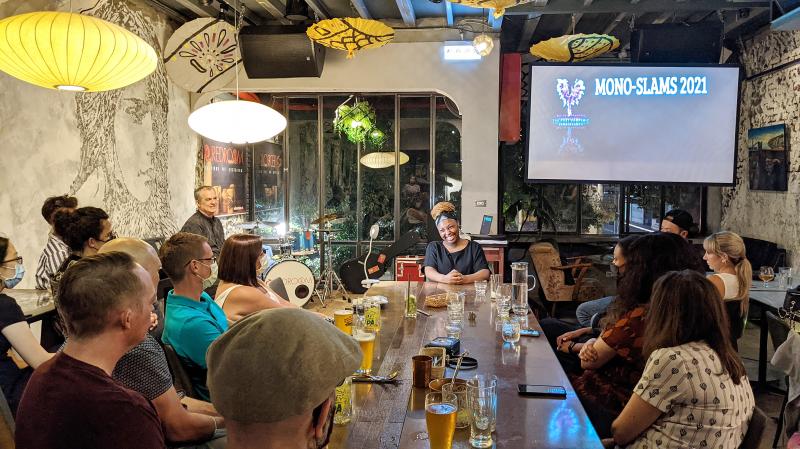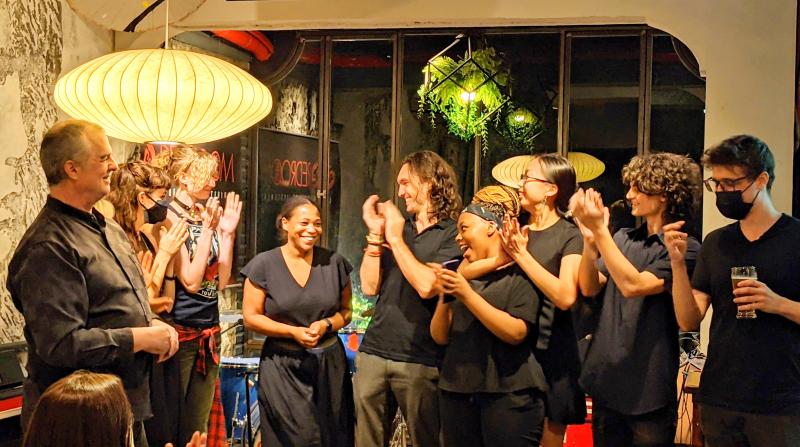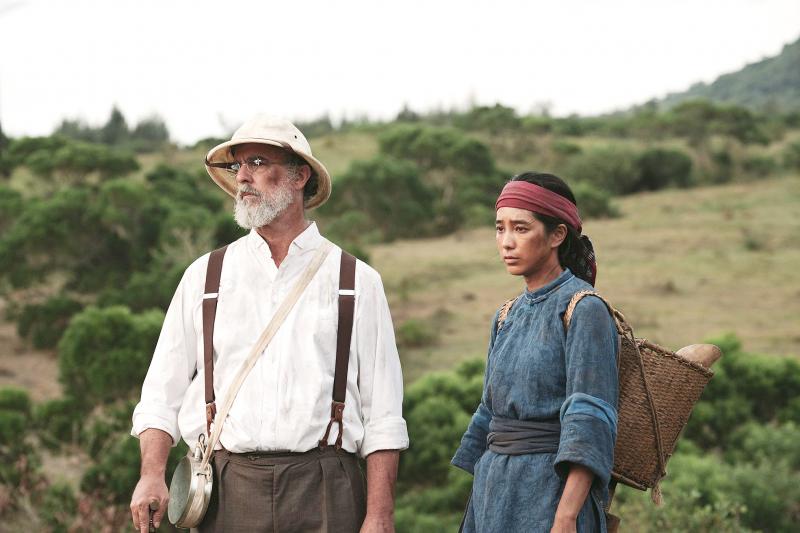The pandemic seems to be far from over, but the Post Pandemic Renaissance Theater (PPRT) is getting a head start by putting on its first event last Friday: the first round of the Taiwan Monologue Slam.
Ten contestants delivered passionate and nuanced pieces on stage, and the audience voted with their phones for two winners who will advance to the local finals in November. There will be four finals in the next year, and each winner is automatically entered into the World Monologue Games regional finals, bypassing the preliminaries.
The goal is to eventually get a Taiwan team to next summer’s games, while also encouraging locals who want to practice English to engage in experiential learning, company founder and artistic director Stewart Glen says.

Photo: Han Cheung, Taipei Times
Don’t be intimidated by the talent on stage last week as the slammers at the first event were all English-speaking members of the PPRT company, and first place winner Cleo Whittingham is a seasoned, classically-trained actress. Glen hopes to attract a wider range of participants over the next two months with a lofty goal of having the final team being 80 percent Taiwanese. This is in line with the government’s vision of developing Taiwan into a bilingual nation, he says.
“If the Taiwanese slammers show interest and promise, they will be invited to train with us to build their English confidence skills,” Glen says. “You don’t have to be an actor to be a slammer. This is less for people that want to be actors and more for frustrated ESL students.”
The company is keeping busy in the next two months, with monologue slams every other Friday at the Red Room Rendezvous, and live staged readings of acclaimed as well as original screenplays on alternate Fridays at 23 Comedy Club. Both event formats will not have sets, props and costumes so that the focus is purely on the raw and honest acting skills, Glen says.

Photo: Han Cheung, Taipei Times
This Friday’s reading will be of After Miss Julie by Patrick Marber, and on Oct 1 they will debut their first original: Thomas Kyd’s The Scottish Lady by former Taipei resident Jamie Lewis Huss, a reimagining of Shakespeare’s MacBeth that sees “Lady M” attempting to rid Scotland of toxic masculinity.
Glen, who has three decades of acting and coaching experience, says it was Huss’s cheeky “full five-act plays in iambic pentameter” that led him to originally start the company about a year ago.
“He has a big hate-on for Shakespeare, so he writes as if Shakespeare has stolen the plays,” Glen says. “He always put an Elizbethan writer’s name before the title as if it’s an unearthed script.”

Photo courtesy of Howard Yu
The only one that Huss actually attributes to Shakespeare is Robin Hood, which the real-life Shakespeare did not write and it portrays the titular hero and William the Conqueror in a same-sex love affair.
Impressed, Glen set out to bring these plays to full production. The Friday readings are just the start, and despite the lack of frills, they are directed and thoroughly rehearsed.
The monologue slams, on the other hand, is part of Glen’s mission to change the way locals learn English. Instead of buxibans (cram schools), he champions the idea of a lianxiban (練習班, practice class) where people hone their skills through experiential learning, especially acting. One workshop Glen offers is the Actor Workout. He meets the student on Zoom and sends them a monologue, upon which the student does a cold reading. They discuss it, and the student gets 10 minutes to rehearse and do a second take, and by the third, the results are usually quite amazing, he says.
It doesn’t matter if they can’t fully grasp the cultural nuances of the plays; the point is exposure and practice.
“They don’t accept here that language is an art,” Glen says. “How do you get better at art? Practice, practice, practice, but they still think it’s study, memorize, test. In experiential learning, it’s a pass / fail system with a quantitative assessment, you put in the work and you pass.”
Tickets for the slams are NT$300, including one drink; stage readings are NT$400
Those interested can audition now. For more information, visit www.facebook.com/postpandemicrenaissance

The People’s Republic of China (PRC) invaded Vietnam in 1979, following a year of increasingly tense relations between the two states. Beijing viewed Vietnam’s close relations with Soviet Russia as a threat. One of the pretexts it used was the alleged mistreatment of the ethnic Chinese in Vietnam. Tension between the ethnic Chinese and governments in Vietnam had been ongoing for decades. The French used to play off the Vietnamese against the Chinese as a divide-and-rule strategy. The Saigon government in 1956 compelled all Vietnam-born Chinese to adopt Vietnamese citizenship. It also banned them from 11 trades they had previously

Jan. 12 to Jan. 18 At the start of an Indigenous heritage tour of Beitou District (北投) in Taipei, I was handed a sheet of paper titled Ritual Song for the Various Peoples of Tamsui (淡水各社祭祀歌). The lyrics were in Chinese with no literal meaning, accompanied by romanized pronunciation that sounded closer to Hoklo (commonly known as Taiwanese) than any Indigenous language. The translation explained that the song offered food and drink to one’s ancestors and wished for a bountiful harvest and deer hunting season. The program moved through sites related to the Ketagalan, a collective term for the

As devices from toys to cars get smarter, gadget makers are grappling with a shortage of memory needed for them to work. Dwindling supplies and soaring costs of Dynamic Random Access Memory (DRAM) that provides space for computers, smartphones and game consoles to run applications or multitask was a hot topic behind the scenes at the annual gadget extravaganza in Las Vegas. Once cheap and plentiful, DRAM — along with memory chips to simply store data — are in short supply because of the demand spikes from AI in everything from data centers to wearable devices. Samsung Electronics last week put out word

Growing up in a rural, religious community in western Canada, Kyle McCarthy loved hockey, but once he came out at 19, he quit, convinced being openly gay and an active player was untenable. So the 32-year-old says he is “very surprised” by the runaway success of Heated Rivalry, a Canadian-made series about the romance between two closeted gay players in a sport that has historically made gay men feel unwelcome. Ben Baby, the 43-year-old commissioner of the Toronto Gay Hockey Association (TGHA), calls the success of the show — which has catapulted its young lead actors to stardom -- “shocking,” and says